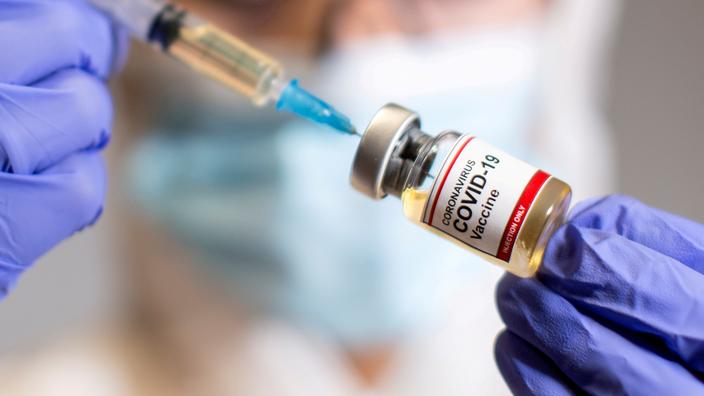Still uncertain a few weeks ago, the prospect of a vaccine protecting against Covid-19 has materialized in recent weeks.
The vaccination campaign should begin in France at the end of the year or at the beginning of 2021. It promises to be a huge logistical challenge.
Securing of orders, supply, storage, transport, priority population ... The decisions to be taken remain numerous and involve a multitude of actors.
The executive will unveil its vaccine strategy in early December.
In the meantime, we offer you an overview, country by country, of some of our European neighbors.
Read also: Covid-19: how France is preparing for the arrival of vaccines
The
Germany
seems to be the most advanced nation among the Twenty-September
Authorities hope to start vaccinations before Christmas, once the European Medicines Agency gives the green light.
The federal state will ensure the purchase and delivery of the doses, the regional states will provide syringes, needles, dressings and antiseptic lotions.
The country has secured the supply of 300 million doses through the European Union, bilateral contracts and purchase options.
According to the Minister of Health, this will be more than enough to vaccinate the population, or even to share the surplus with other countries.
A few hundred vaccination centers are already popping up across the country, supplemented by mobile teams.
The most populous land in Germany, North Rhine-Westphalia, has planned 53 and Bavaria at least 96. In the capital, Berlin, there will be six centers.
Two airport terminals, at Tegel and Tempelhof, were requisitioned.
But if the authorities think big, vaccination will not be mandatory, insisted the Minister of Health, Jens Spahn.
The
Spain
also unveiled its vaccination plan.
This campaign is expected to begin in January.
"During the first phase, we will focus on the most vulnerable people, a group of around 2.5 million people,"
said Minister of Health Salvador Illa.
The government has chosen to give priority to the elderly in retirement homes, very affected by the pandemic, as well as the staff who take care of these residences.
Nursing staff and people in a situation of dependency will in turn be vaccinated.
Eighteen distinct groups will be successively invited to visit one of the 13,000 vaccination centers deployed across the country.
Spain hopes to obtain 140 million doses via the EU in order to immunize most of the population in the first six months of 2021.
“The vaccine will be free and will be administered through the national health system”
, and it will be done on a voluntary basis, detailed the minister.
Numerous "anti-vaccines" in Italy
In
Italy
The government is due to present its detailed plan on December 2.
The country expects to have vaccinated most Italians by next September.
Vaccination should begin at the end of January and will begin with the categories of the population most at risk.
Rome has reserved 70 million doses of vaccine via the EU with the AstraZeneca laboratory.
Sixteen million of them should be delivered in the first months of 2021 and allow 8 million people to be vaccinated initially.
According to Reuters, the entire order is expected to be fulfilled in mid-2021.
Added to this is an order expected in early January for 3.4 doses of the vaccine developed by Pfizer and BioNTech, making it possible to immunize 1.7 million people.
The government will, however, have to deal with an anti-vaccine movement that has many followers in Italy.
Forty-four percent of Italians say they'll get vaccinated without a doubt, 26 percent only if it's mandatory.
On the other hand, 37% do not want to take the risk of being vaccinated and 11% would not do so even if it was mandatory, according to a survey carried out in November for the La7 channel.
Read also: Covid-19: what strategy to get vaccines accepted?
In
Belgium
, the government announced in mid-November its intention to treat at least 70% of the country's population - or at least 8 million Belgians - with vaccines.
"The priority groups will be determined on the basis of scientific advice and a societal debate
,
"
said the Interministerial Conference on Public Health, bringing together the Minister of Health, Frank Vandenbroucke, his counterparts from the federated entities.
Three groups should be given priority: health workers, those over 65 and those at risk aged 45 to 65.
A member of the EU, the country is also participating in the European procedure for purchasing anti-Covid vaccines.
So far, Belgium has registered to receive more than 20 million doses of vaccines: 7.74 million from AstraZeneca, 5.16 million from Johnson & Johnson, 5. million from Pfizer / BioNTech and 2 , 9 million from the German pharmaceutical group CureVac.
Vaccination will not be compulsory but open to volunteers and free.
The
UK
strategy
is also largely based on the vaccine developed by the British laboratory AstraZeneca and the University of Oxford.
The country is the first to have signed an agreement with them.
This guarantees him access to 100 million doses, according to the Ministry of Health.
Once the vaccine is cleared, 4 million doses will be delivered to the UK before the end of the year, followed by another 40 million before the end of March 2021. The government officially requested Friday (November 27th) to the Health Regulatory Authority of drugs to determine whether their vaccine meets rigorous safety standards.
Thursday, the managing director of AstraZeneca had announced that the vaccine would be subjected to
“an additional study”
after criticism concerning its first results, without this does not delay according to him its approval by the European and British regulators.
The previous week, he had already asked his health regulator to examine the Pfizer / BioNTech vaccine, of which he should receive 40 million doses.
In total, the British government says it has ordered more than 350 million doses of vaccine.
SEE ALSO
- Covid-19: in Sweden the fear of a vaccine failure is growing








